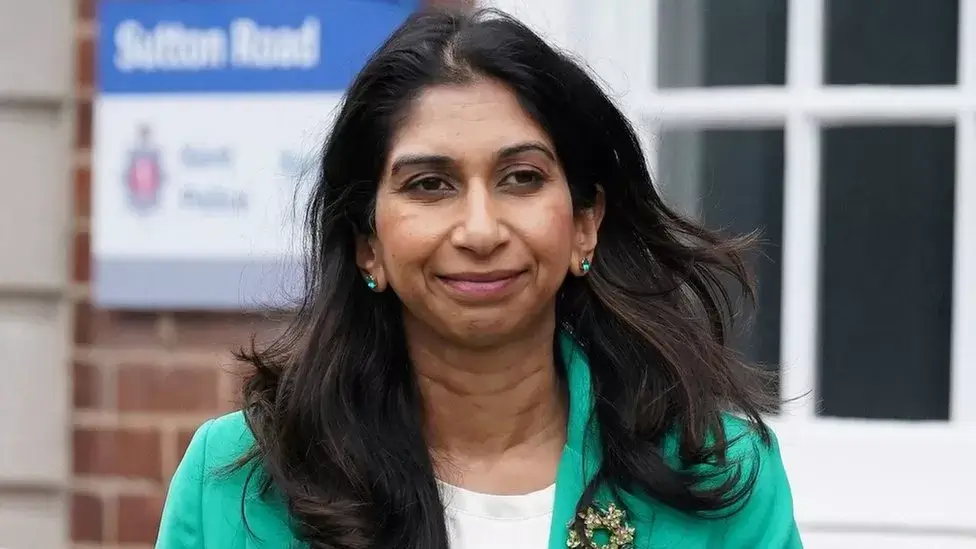Meta, the parent company of Facebook, finds itself embroiled in a contentious dispute with the government over its plans to implement end-to-end encryption (E2EE) for its messaging services. The crux of the issue lies in the perceived trade-off between privacy and child safety, with both sides presenting their arguments passionately.
The move towards E2EE by Meta would mean that only the sender and recipient of a message would have access to its contents, effectively blocking any third-party, including the platform itself, from reading the messages. This technology has been championed by proponents as a crucial safeguard for user privacy, protecting individuals from unauthorized access, hackers, fraudsters, and prying eyes.
On the other hand, Home Secretary Suella Braverman has voiced her concerns, primarily centered around child safety. She fears that E2EE could be exploited by individuals engaged in child abuse to conceal their heinous activities. Ms. Braverman contends that the privacy-enhancing encryption could inadvertently facilitate child exploitation by making it difficult for authorities to detect and intervene in cases of abuse.
In an attempt to garner support for her stance, Ms. Braverman co-signed a letter in July with technology experts, law enforcement officials, survivors of child abuse, and leading child safety charities. The letter urged Meta to provide assurances that it would implement robust safeguards to protect against the misuse of E2EE for illicit purposes. However, Ms. Braverman later expressed her disappointment, stating that Meta failed to provide the necessary reassurances.
Meta, for its part, vehemently defends its commitment to user privacy and safety. The company argues that it does not want to invade users’ privacy by reading their private messages, aligning its position with the notion that most people value the confidentiality of their digital communications. Furthermore, Meta emphasizes that it has dedicated significant effort and resources over the past five years to develop robust safety measures aimed at preventing, detecting, and combatting abuse while maintaining online security.
Meta anticipates that even with the implementation of E2EE, it will continue to provide law enforcement with more reports compared to its peers due to its industry-leading work on user safety. The company seeks to strike a balance between encryption and safety measures to protect children and vulnerable individuals online.
However, according to Home Secretary Braverman, the introduction of E2EE could result in hundreds of child abusers escaping punishment, posing a significant threat to society. The National Crime Agency’s director of general threats, James Babbage, echoes this concern, warning that the move would “massively reduce our collective ability” to protect children.
This ongoing dispute between the government and Meta is part of a larger campaign against E2EE, with security minister Tom Tugendhat condemning the decision and placing blame on Mark Zuckerberg, Meta’s CEO, for this “extraordinary moral choice” to expand encryption.
Meta’s announcement to implement E2EE in all Facebook messenger chats by the end of the year comes in the context of its ownership of encrypted messaging app WhatsApp. It’s worth noting that other platforms like Signal and Apple’s iMessage also employ encryption to protect user privacy. All these platforms have expressed concerns about potential measures in the recently passed Online Safety Bill that could undermine the privacy of encrypted messages.
To address some of the government’s concerns, Meta has outlined its intention to use artificial intelligence and other tools, within the bounds of applicable law, to proactively identify accounts engaged in malicious behavior, rather than scanning private messages. Additionally, Meta has imposed restrictions on adult users messaging teenagers who don’t follow them as an additional safety measure.
The government, however, remains firm in its position. Suella Braverman states that the Online Safety Bill grants regulatory powers, through Ofcom, to direct companies to take necessary steps under certain circumstances. Nonetheless, she expresses a preference for working collaboratively with social media companies, acknowledging their significant role in modern life.
To further bolster its case against Meta’s E2EE plans, the Home Office has joined forces with the Internet Watch Foundation (IWF) to provide guidance for parents on how to keep their children safe online if Meta proceeds with the implementation of E2EE. The campaign includes a film featuring the testimony of a survivor of child sexual exploitation online.
The IWF reports a concerning trend, with the most severe forms of online child sexual abuse doubling since 2020. The Online Safety Bill passed on Tuesday empowers Ofcom to compel companies to deploy approved technology that can identify child sexual abuse material in encrypted messages. While government experts argue that technology exists to allow E2EE while still alerting authorities to child sexual exploitation, others believe that achieving both goals is a complex and delicate balance.
Ciaran Martin, the former head of the National Cyber Security Centre, warns against the notion of scanning for child abuse content in encrypted messaging apps, suggesting that it could entail processes that compromise the privacy of all users. He cautions that creating such a “door” into devices could be misused for nefarious purposes beyond child protection.
The dispute between the government and Meta underscores the ongoing challenge of finding a balance between user privacy and online safety, particularly when it involves protecting the most vulnerable members of society. The outcome of this debate will likely have far-reaching implications for the future of online communication and digital privacy.





